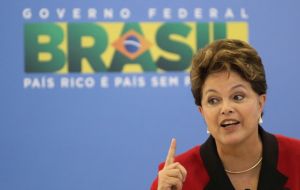MercoPress. South Atlantic News Agency
Rousseff bites back to protests: highway-blocking banned and organizers will be fined
 The right to come and go, to transit is a fundamental democratic right in Brazil, said President Rousseff
The right to come and go, to transit is a fundamental democratic right in Brazil, said President Rousseff Brazilian president Dilma Rousseff reacted swiftly to the latest national stoppage saying that her government will not tolerate protests blocking highways or streets and with the Ministry of Justice will draft rules to fine those organizations responsible for such actions.
“We respect the right to demonstrate, to protest, peacefully but the right to come and go, to transit is also a fundamental right in Brazil, a democratic right. No one can protest interrupting streets”, said President Rousseff on Thursday on arrival in Uruguay for the Mercosur summit.
Rousseff added that Brazil is so strong in democratic terms: “we manage to live peacefully and positively with all demonstrations, we must transform that energy in accelerating those issues, in improving those services that the country is lacking”.
Finally the Brazilian leader said that “the social conquests for the Brazilian people have come to remain, no one should have the least doubt: on the contrary we want to continue advancing with those conquests and those gained social rights”.
On Thursday a one day nationwide general strike, meant to capitalize on a wave of mass demonstrations across Brazil last month, produced mixed results on Thursday, with some cities and states disrupted severely and others largely unaffected.
Demonstrators blocked two of the nation’s main ports for much of the day, along with several highways essential to commerce in Brazil which link Sao Paulo with Rio do Janeiro. Many banks and schools, along with some factories, were closed or occupied, as employees marched in the streets or conducted sit-ins outside their places of employment.
In contrast to last month’s mass protests, which began spontaneously, relied on social media to spread a broad-ranging message and had few identifiable leaders, the “National Day of Struggle” on Thursday was called by Brazil’s eight main labor union federations and was heavily scripted. The unions, which have a combined membership of six million, even met in advance with the authorities to work out the rules of the protest.
Some of the union federations, as well as the Landless Rural Workers’ Movement, which also participated in Thursday’s strike, have a friendly relationship with the government and the Workers’ Party, which has been in power since 2003 and was one of the main targets of the protests in June. As a result, there has been talk of the government’s trying to co-opt the protest movement through the unions, and some of last month’s most enthusiastic participants decided to keep their distance from Thursday’s strike.
The unions also did not seem to have a unified message despite negotiations among the eight labor federations aimed at producing a common agenda. While some opponents of the government called for the ouster of President Dilma Rousseff, whose popularity has fallen sharply since the start of the protests, those in the government camp carried banners endorsing the vague promises of political reform that Rousseff has been making in an effort to defuse the movement.
With the exception of those in Rio, most of Thursday’s marches went off without violence. At some highway blockades, tires were burned and a few windows were broken, but over all, the police and the demonstrators seemed to be making an effort to be on their best behavior.
In Rio, however, a confrontation between a small masked group — which ignored the appeals of march organizers to refrain from violence — and the police led to the use of tear gas and an abrupt end to what had been a peaceful afternoon demonstration. After dark, protesters who had gathered outside the state governor’s palace to demand his removal were dispersed with tear gas and pepper spray after they set off fireworks and threw garbage cans at the building.
The main focus of Thursday’s strike seemed to be traditional issues like wages, working hours, pensions and benefits — of obvious interest to the teachers, nurses, bank tellers, bus drivers and factory workers who turned out in large numbers. “A first-class country can’t have third-class jobs,” read posters plastered on buildings downtown.




Top Comments
Disclaimer & comment rules-

Read all comments“but the right to come and go, to transit is also a fundamental right in Brazil, a democratic right. No one can protest interrupting streets”, said President Rousseff on Thursday”
Jul 12th, 2013 - 07:42 pm 0As life should have been the fundamental right of the American Military Officer murdered in front of his wife and children by members of you “cell”. Ah, but you claimed you knew nothing about it didn’t you?
So you were incompetent then and the way you are dealing with things presently you are not showing that you have learnt much.
If you are not careful, this fiasco is going to get away from you big time.
Commenting for this story is now closed.
If you have a Facebook account, become a fan and comment on our Facebook Page!